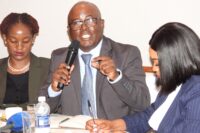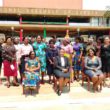GOVERNMENT in partnership with the United Nations in Zambia will on April 21, this year, hold a virtual High-Level dialogue aimed at increasing women’s participation in the electoral processes.
In a statement, Friday, Office of the Vice-President Permanent Secretary for administration Stephen Mwansa stated that the dialogue would also tackle other issues affecting women in the electoral system.
“The Government of the Republic of Zambia, through the Office of the Vice-President, in partnership with the United Nations in Zambia, will on April 21, 2021 hold a virtual High-Level Dialogue aimed at increasing women’s participation in electoral processes and addressing violence against women during elections. The Dialogue, organised in the lead up to Zambia’s general elections on August 12, 2021, will also tackle other reasons for Zambian women’s underrepresentation in the electoral processes, decision making structures and the broad socio-economic development agenda of the country,” he stated.
Mwansa noted that women’s participation in governance continued to be limited not only in Zambia but world over.
“The Dialogue will further demonstrate that in Zambia, like many countries globally, women’s participation in governance continues to be limited, yet it remains a top priority and a critical element for achieving gender equality. Evidence from across the globe has shown that only when women and men have full access to decision-making positions will laws, policies, and budgets reflect the needs of all citizens and support women’s rights and inclusive development as well as sustainable peace and empowerment in homes, communities and nations at large,” he said.
Mwansa noted that although Zambia achieved 19 percent women representation in Parliament following the 2016 general elections, it still did not meet the SADC protocol on Gender and Development which requires at least 50 percent female representation.
“In order to underscore the importance of the Dialogue, it is important to note that following the 2016 general elections, Zambia achieved 19 percent women representation in Parliament, 6 percent more than the previous elections. Although this was a remarkable improvement, the outcome still falls short of the Southern Africa Development Community (SADC) Protocol on Gender and Development that calls for at least 50 percent female representation in decision making positions; and the regional average of 24 percent in 2019, as well as the global goals set in the Beijing Platform for Action, especially the provisions on women’s equal access to and full participation in power structures and decision making; the African Union (AU) Agenda 2063 which calls on the AU member states to ensure the effective participation of women in decision-making,” stated Mwansa.












